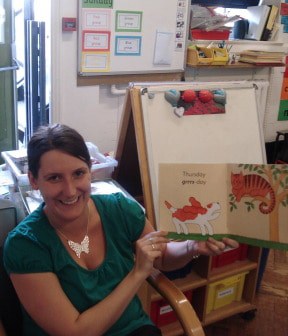School teachers work in state and independent schools across the country and are responsible for the education of young people from the time they begin school, aged four or five, to when they leave in their teens after GCSEs or A-Levels.
School teachers form a vital part of the education sector. They go to school each day and teach children across the country about different subjects. From day to day, they are responsible for much more than just teaching their pupils and making them sit exams. They are also in a position of responsibility and may have to give advice and support to their pupils.
At primary school level, children are aged 5-11 years old. Children stay in class groups and are taught a range of subjects by one teacher. At secondary school level, children are aged 11-16, and in schools with sixth forms students are aged up to 19. At secondary school, teachers will teach lessons on a particular subject that is on the national curriculum. Teachers have to help their pupils learn at an appropriate level of difficulty for their age. Middle schools exist that take children from ages 8 and 9 to 12 and 13. School teachers in middle schools teach the primary or secondary curriculum, depending on the age of the children in their class. Although they are working towards targets, they have the freedom to teach in their own particular style.
Teachers work in different conditions depending on their subject. They may have a classroom which they stay in throughout the school day, or move around the school. They may use computers, videos, DVDs and other technology as well as textbooks as an aid to their lessons.
As a profession, teaching is not dominated by men or women.
Salary
Unqualified teachers earn between £15,113 and £23,903 a year (£19,007 – £27,794 in central London.)
Qualified primary and secondary teachers earn between £20,627 and £30,148 a year (£25,000 – £34,768 in central London.) Head teachers earn between £40,290 – £78,642 a year, and in some cases more than this.
Primary and secondary school teachers reaching the top of the main scale may apply to be assessed to progress to the upper pay scale. This is between £32,660 -£35,121 (£39,114 – £42,419 in central London.) Salary scales are reviewed each year. (More details can be found on the Training and Development Agency for Schools website.)
As the school year is only 39 weeks of the year, school teachers have longer holidays than many other professions.
Responsibilities
Both primary and secondary school teachers must:
- Prepare lessons and teaching materials in line with national learning objectives.
- Teach lessons.
- Mark and assess pupils’ work, giving appropriate feedback.
- Maintain clear records of lessons taught and pupils’ progress.
- Keep up to date with their subject knowledge.
- Keep up to date with new teaching resources and methods.
- Be prepared to perform pastoral duties.
- Supervise teaching assistants, trainee teachers and newly-qualified teachers.
- Liaise with other professionals, including educational psychologists, learning mentors, careers advisers, and education welfare officers.
- Discuss pupils’ progress with parents and carers.
- Attend meetings and in-service training (INSET) days.
- Organise outings, extra-curricular social activities and sporting events.
- Undergo observations of their teaching as part of continuing personal development.
As a primary school teacher, you must:
- Be responsible for a class throughout the school day, teaching them most of the areas covered by the national curriculum yourself.
- Teach your specialist subject to other classes.
As a secondary school teacher, you must:
- Specialise in teaching one or two subjects.
- Teach classes of different ages and abilities throughout the school.
- Prepare students in your classes for SATs, GCSEs, A/S levels and A-Levels.
Qualifications
To work as a teacher it is essential to attain Qualified Teacher Status (QTS). This is achieved by completing Initial Teacher Training (ITT) and then completing three terms of teaching in a school.
To begin ITT, you must have GCSEs in English and Maths at grades A-C. You will have to pass tests in numeracy and literacy, and undergo a Criminal Records Bureau check. If you are intending to go into primary school teaching, then GCSEs in Science at grades A-C are also required. If you are intending to go the undergraduate degree/PGCE route to ITT, then to get into university you will need at least two A-Levels as well as five GCSEs at grades A-C. Universities may accept equivalent qualifications, such as the Access to Higher Education course. (More information can be found on the UCAS website.)
ITT may be gained by doing an undergraduate BSc or BEd with a QTS component, or after completing 2 years of higher education, an HND or a foundation degree, taking a shortened two year degree with QTS component. These courses can be found on the UCAS website.
Alternatively, ITT can be gained by doing an undergraduate degree in the subject you would like to go on to teach (or one closely related to it) followed by a Postgraduate Certificate of Education (PGCE). The PGCE takes one year if studying full time or two years part time, and longer if studying by distance learning. School-Centred ITT (SCITT) is another postgraduate option, where trainees work in a classroom. Schools devise their own training programme in partnership with their Local Education Authority. SCITT usually leads to gaining a PGCE and takes one year.
Subjects which have a national shortage of teachers are published on the Training and Development Agency for Schools website, and enhancement courses convert students who have already been accepted on to a PGCE course into these shortage subjects.
Teach First is a charity which runs an independent graduate teacher training programme in Greater London, the North West and the Midlands. Graduates are placed in challenging schools to gain their QTS after a short course in teacher training. They are also given leadership training. A final postgraduate option is the Graduate Teacher Programme (GTP).
The Overseas Trained Teacher Programme confers QTS to teachers who have qualified outside the EU, whose teaching qualification is equivalent to a degree from the UK. Accreditation is provided by the General Teaching Council for England.
After ITT, new teachers must complete three terms as teacher in a school before they can be considered fully-qualified. During these three terms they work on a timetable with reduced teaching hours, supported by a qualified teacher who acts as their mentor.
The Scottish Government Education and Training website have full details of the qualifications and training system for teaching in Scotland.
Skills
School Teachers have many diverse tasks. Important skills and qualities that they need include:
- Enthusiasm.
- Interest in the progress and welfare of pupils.
- IT literacy.
- Ability to develop good working relationships with a wide range of people.
- Ability to use your own initiative.
- Very strong organisational and time-management skills.
- Ability to manage large classes and challenging behaviour.
- Patience and a sense of humour.
- Self-awareness.
- Willingness to embrace new technology for the classroom.
Working conditions
School hours are generally from 9am to 3.30 or 4pm. During term-time, teachers may work up to 50 hours a week when taking into account time spent preparing lessons, marking, training and in meetings with other staff or parents. In this respect, teaching can be a stressful job.
At secondary level, the subject will determine whether a teacher works in a classroom, laboratory, music room, gym or outside on the sports pitches. Secondary school teachers do not necessarily a classroom of their own and may have to walk between lessons carrying books or equipment.
School buildings vary enormously, as do the resources and amenities available to teachers in different schools.
Teaching jobs are available in most towns and cities throughout the country, although if you are mobile it will improve your prospects of getting a job. Staff turnover tends to be higher in inner-city schools.
Approximately 55% of secondary school teachers are women, although proportionally more head teachers are male, and gender balance varies across subject areas. Certain teaching roles require a male or female teacher specifically, such as teaching Physical Education (PE) to girls.
Experience
When you approach ITT it will be helpful to have some experience of working with children, especially the age group you are going to be teaching. Experience can be gained through babysitting, sports coaching, assisting with play schemes, summer camps and youth clubs, tutoring or mentoring.
Employers
The state sector offers the highest number of jobs for secondary teachers, in maintained and Local Education Authority schools. Teachers also work in independent schools, sixth-form colleges, pupil referral units, hospitals, young offenders’ institutions and secure units. There are opportunities for teachers overseas in international schools and schools for the families of the armed forces.
Organisations such as museums, art galleries and zoos employ teachers as education officers.
Career Progression
Teachers may progress to other positions with more responsibility within their school or at another school, such as curriculum leader, head of year, head of department, deputy head teacher, or head teacher. Teachers with excellent classroom skills may be awarded the status of Advanced Skills Teacher (AST). ASTs may choose to take on the responsibility of supporting other teachers as well as teaching their own classes.
The Fast Track programme is a programme of coaching, mentoring and development activities which talented teachers may apply to for an accelerated path into senior roles. The selection process for the programme is challenging, and applicants must have the support of their head teacher.
Teachers may choose to specialise in teaching Special Educational Needs pupils, become lecturers in further education, or school inspectors.
Self-employment opportunities for teachers include private tuition, writing educational materials, or running a small private school.
The skills that teachers possess may help them change careers, moving into fields such as social work, policing and management.
Image

Also known as…
- Teacher
- Tutor
Related Jobs
What’s it really like?
Rebecca Jenkins, 28 is a primary school teacher. She works in a primary school in London.
I worked for a year after my degree and then I trained for another year for my PGCE. This is the first teaching job I have had, and I’m about to start my fourth school year.
In a typical day at work I teach the children numeracy and literacy in the morning. In the afternoons, I approach other skills through a topic, which will have a focus on history, geography, science or art. On some days, the children have PE or Information Computer Technology (ICT) as well. The children leave at half past three and then I usually work until half past five. I have to prepare lesson materials and classroom displays, and keep my records up to date. At times a typical day will be longer, starting at half seven and finishing at six. I try not to take work home, but sometimes it is inevitable!
I teach French to some of the older children in the school and this may be something I develop in the future. I would like to take it further, but I also have a keen interest in Early Years education and phonics, so I will have to see where that takes me…
In teaching, even starting salaries depend on experience, but once you become any form of manager then the salary can increase. Everyone grumbles about the money, but there isn’t anything I dislike about the job. Every single day at work is different. Children are great to work with and very entertaining. It is satisfying seeing the children progress as they learn. The long holidays are a bonus too!
The advice I’d give to someone thinking of doing this job is to go for it! It is great fun. It is hard work, especially when you’re exhausted and it’s the end of term, but it is very rewarding.









